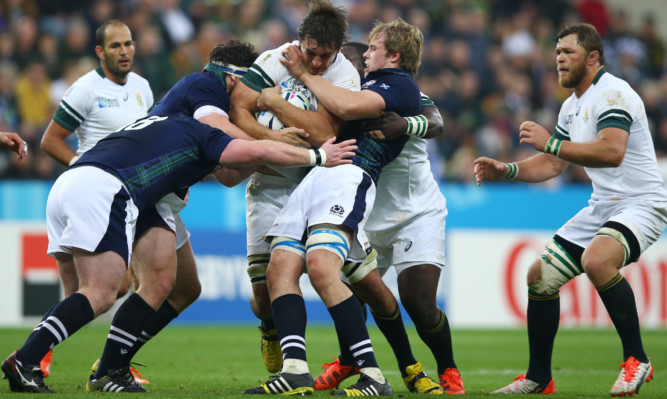The shadow of the axe concentrates the mind in most cases.
It didn’t for England on Saturday night at Twickenham. Drinking at the proverbial and clichd last chance saloon, the tournament hosts were shunted out of the Rugby World Cup by a lively and ebullient Australia.
For South Africa, the axe has been poised for two weeks, since their upset loss to Japan in the opening match in Pool B. Unlike England did later, the Springboks played at St James’ Park on Saturday knowing it was their last chance, beating erstwhile leaders Scotland 34-16 to reclaim control of the pool.
The Scots had no such intimidating incentive. Ever since the draw and schedule were made for this World Cup, the final pool match against Samoa has been clearly the fixture of premium importance. Indeed, next Saturday’s game will surely define the first part of Vern Cotter’s tenure as head coach if not all of it – and he probably recognised this as soon as he took the job.
Next Saturday is Scotland’s last chance, the knockout stage effectively starting. South Africa have been playing knockout rugby ever since the debacle in Brighton.
It’s this that part explains Scotland’s rather tentative displays in the first halves of the three games in RWC 2015 so far. This was most pronounced on Saturday in Newcastle because of the contrast of the Springboks leaping from the traps like they wanted to get everything settled by the shortest possible route in the quickest possible time.
There’s no mystery here; it’s South Africa’s core rugby value. The masses of green shirts in the stands outnumbered by Scots but not visibly so, as virtually all their fans were in colours expect nothing less. Scotland certainly didn’t expect anything else.
So why were they unable to stop it? Scotland have physical specimens to match the outstanding Springbok second rows Lood de Jager and Eden Eztebeth. They have hitters to stop the big young centres in their tracks, and even this perceived “second string” did so for much of the second half, even a man down when Grieg Laidlaw was sin-binned for a foolish and unnecessary take-out of Bryan Habana.
South Africa were dominant not because they have a superior physicality or conditioning, they had it because their desire was that much greater. They knew defeat meant an ignominious trip back home in disgrace.
You saw it after Tommy Seymour’s try for Scotland turned the match into a contest. Reined in to just a seven point lead after dominating so long, the South Africans might have flinched. Scotland, corralled by aggressive defence to that point, had shown again they have the ability to strike from anywhere on the field.
Fortunately for the Boks, they had skipper Fourie du Preez’s calm control and fly-half Handre Pollard. His was the pass that was intercepted by Duncan Weir to create the Scottish try, but he made amends with an immediate drop goal giving his skipper a subtle nod to indicate it was on and then booted a penalty from near halfway after David Denton was too enthusiastic at a ruck.
With Laidlaw off, that was effectively game over, Bryan Habana’s late try simply embellishment.
Anyway, in contrast to the Springboks, the Scots still had the get-out clause of a struggling Samoa next week. In the first half they were tentative and let the Springboks come on to them a bad thing to do for a team that thrives on momentum. In the old truism of rugby, the team on Saturday that wanted it more won.
One assumes that inheriting this incentive of going home if they lose and a fair degree of ignominy to go with it given Samoa’s capitulation to Japan will have the Scots get out of the sheds with some purpose on Saturday.
Cotter’s frustration with this slow starting being pointed out showed afterwards, and it’s certainly in stark contrast to the 6 Nations, when the Scots generally played decently in the first half and fell away in the second.
When asked about that earlier in the week the coach had suggested it showed a development to his side since the spring. In truth, it just looks like one of Scotland’s traditional problems a spell in the match where they tend to go missing has just been moved to a different time slot.
The 80-minute performance we continually hear about as an aspiration of the team seems as elusive as ever it’s ever been.
Samoa look in such a mess and have absolutely no incentive to play for other than pride that it might not require an 80-minute performance to beat them on Saturday.
But Scotland badly need to make a telling statement in this game. If they are to beat Samoa, make the quarter-finals and make any impression on either Australia or Wales, they have to get into the mindset knockout rugby now.
Which means playing at full pelt from the first whistle at last.
